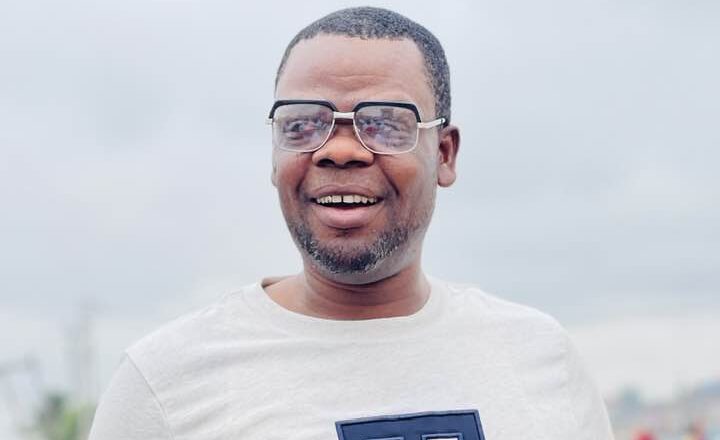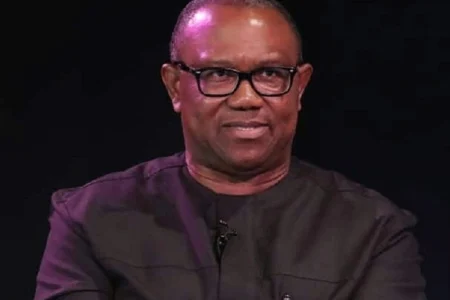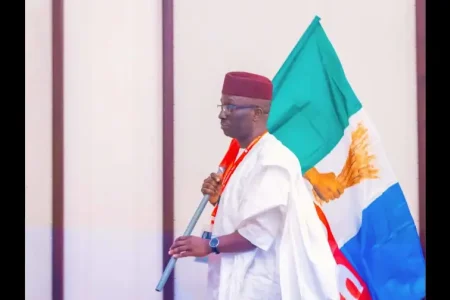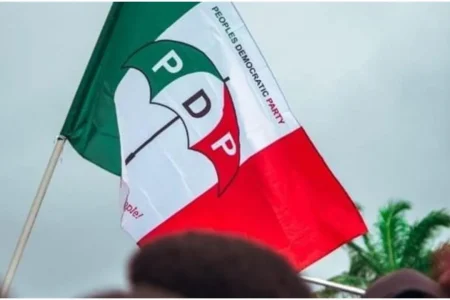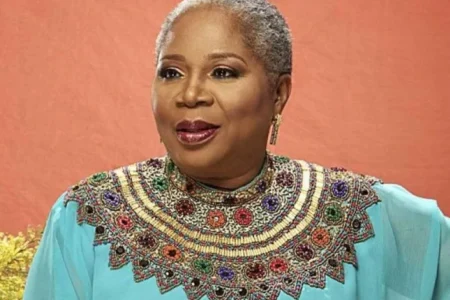Dr. Oriyomi Hamzat, a broadcast journalist and Chairman of Agidigbo 88.7 FM in Ibadan, Oyo State, shares how his period of incarceration transformed his perspective and empowered him to advocate for justice.
-
How would you describe yourself?
I’m Oriyomi Hamzat, a seasoned broadcast journalist, dedicated human rights activist, and staunch advocate for truth. With over two decades of experience in broadcasting, I’ve honed my craft and remained steadfast in my commitment to integrity and accountability. Originally from the Akinyele Local Government Area of Oyo State, I am the son of the late Alhaji Asimiyu Adekunle Hamzat, a revered figure known for his impactful journalistic work on the NTA network. His legacy of holding those in power accountable continues to inspire me.
Growing up, I had the privilege of learning invaluable lessons from my mother, a dedicated homemaker. Her wisdom and teachings have profoundly influenced my life and career, guiding me in navigating challenges and making principled decisions. These lessons remain invaluable to me, shaping my journey from then until now.
-
What drives you as a professional and activist?
To be candid, my inclination towards broadcasting stems from a deep-rooted familial connection. It’s not just a career choice; it’s part of my DNA. Raised in an environment where broadcasting was a constant presence, thanks to my father’s involvement in radio and television, I naturally gravitated towards the medium, particularly radio, which became my steadfast companion during my formative years. Witnessing the profound impact that radio could have on shaping society solidified my resolve to pursue a career in broadcasting.
On the humanitarian front, I owe much to my mother, whose altruistic spirit and unwavering commitment to helping others left an indelible mark on me. Her principles of cheerful giving, selflessness, and sincerity of purpose served as guiding lights, instilling in me a deep-seated desire to make a positive difference in the lives of others. Similarly, my father’s example demonstrated the transformative power of the media when wielded for the greater good. His silent teachings on speaking truth to power and championing the rights of the marginalized served as invaluable lessons that I carry with me in my advocacy efforts today.
For me, the pursuit of justice and the fight against injustice are non-negotiable principles. I abhor any form of injustice, a sentiment shared by my father. I firmly believe that the true measure of a person’s legacy lies not in the accumulation of wealth or power, but in the impact they have on the lives of others. This belief serves as a driving force in all my endeavors, motivating me to use whatever influence, power, or wealth I may possess to uplift and empower those in need, leaving behind a legacy of compassion and positive change.
-
Some people believe you rose to prominence riding on your father’s name rather than hard work. What is your response to that?
I’d say it’s a blend of both factors. Reflecting on the significant influence my father had on my life, both personally and professionally, I recognize the immense privilege of carrying his name. Even during his lifetime, his name held considerable weight, opening doors and garnering respect wherever I went. I witnessed firsthand how people esteemed the Hamzat name, and it underscored the responsibility I felt to uphold and honor his legacy.
In my professional journey, I’ve strived to build upon the foundation he laid, embracing his values of truth, human rights advocacy, and professionalism. However, along with this privilege comes a weighty burden—I cannot afford to tarnish his legacy or veer from the principles he stood for. His dedication to truth, diligence, professionalism, and compassion set a high standard that I am compelled to uphold.
Ensuring that the name “Kunle Hamzat” continues to symbolize integrity and excellence requires relentless effort and unwavering commitment. It’s a responsibility I willingly shoulder, understanding that it’s not just about preserving his legacy but also about elevating it to new heights. In essence, it’s a harmonious blend of building upon his foundation while also striving to exceed the standards he set.
-
Was becoming a media entrepreneur a personal choice?
If you’re referring to my aspirations in terms of my professional journey, such as becoming a respected broadcaster and advocating for people’s interests, then yes, those were indeed dreams of mine. However, the extent to which these aspirations have taken me—owning my own radio station, wielding significant influence, and receiving recognition on regional, national, and global platforms (like recently receiving the International Humanitarian Service Award from the International Human Rights Commission)—were beyond my wildest dreams.
I never imagined that my efforts to contribute to the betterment of humanity or my dedication to amplifying the voices of ordinary people would resonate on such a grand scale in today’s world. These accomplishments were not part of my initial dreams. My aspirations were more centered around being the voice of the people and excelling as a professional broadcaster. The rest, the unexpected recognition and influence, were unforeseen bonuses along the way.
-
In 2017, you were incarcerated for the alleged murder of a 17-year-old boy in Ibadan and remanded in Agodi prison, an issue that set your career growth backward. Can you recount this experience?
It’s an experience that, despite its torturous nature, I hold in high regard. In fact, now that I’ve regained my freedom and been acquitted of all charges, I even joke with my sons about it, remarking that I might not have felt truly fulfilled without enduring that trial. As strange as it may sound, that tumultuous and chaotic chapter of my life was necessary for my personal growth.
Here’s what happened: The state government, feeling threatened by my outspokenness in advocating for the people’s concerns, sought to silence me. Coincidentally, I run an orphanage called the Make A Future Alive Foundation, also known as Ark of Hope Foundation, where I care for street children. One fateful night, around 2 am, one of the children fell critically ill. The orphanage staff rushed him to the hospital, but tragically, he passed away en route. At a police checkpoint, they were stopped, and upon discovering the lifeless child, they were promptly arrested.
Contrary to rumors, I wasn’t present during the incident. However, I voluntarily presented myself at the police station the next morning. Once my identity as Oriyomi Hamzat was revealed, the case garnered significant attention. The government seized the opportunity to silence me by charging me, along with the other individuals involved, including a female caregiver from the orphanage. I was remanded in prison, and the legal battle stretched on for six grueling years until our eventual acquittal earlier this year.
It was undeniably a harrowing experience, but one that ultimately shaped me in profound ways.
-
What were the lessons you learned while you were in Agodi prison?
First and foremost, experiencing prison firsthand reaffirmed the truth behind the Yoruba adage, “Oriyeye ni mogun, taise lo po” (It’s one thing to hear about it, but experiencing it is another). Prison is indeed a world unto itself—a stark reality that I was forced to confront. Within those walls, I gained invaluable insights into the frailties of the Nigerian justice system. I encountered individuals who were unjustly caught in the web of circumstances, their freedoms unjustly stripped away.
I vividly recall the moment we were remanded in prison. The warden’s ominous declaration—”Your freedom is taken away from you”—resonated deeply within me, shaking me to my core. Suddenly, the simple liberties we often take for granted in our everyday lives became luxuries beyond reach. The ability to act and decide freely, once taken for granted, became precious commodities. This experience instilled in me a profound appreciation for these fundamental rights, ones that are often overlooked or undervalued in our daily lives.
While the ordeal was undoubtedly torturous, I now recognize its necessity in reshaping my perspective and priorities. It was a transformative experience—one that left an indelible mark on my life and fundamentally changed me for the better.
-
You became a free man after the court found you not guilty of the alleged murder charge. Was there a point you were scared that the case would not go your way?
Indeed, it was during that period that the true nature of my situation became evident—I wasn’t merely facing criminal prosecution; rather, I found myself entangled in a politically motivated case that had been blown out of proportion. It became apparent that I was up against formidable power and authority, while I possessed none of it. The odds of winning were slim to none. I understood that both the prosecuting counsel and officials of the Directorate of Public Prosecution had received explicit instructions to ensure my prolonged detention. This ordeal served as a stark lesson on the risks of speaking truth to power too loudly. Despite my innocence, I lacked the means to assert my innocence to the world—a significant hurdle to overcome. It underscored the critical importance of having influential allies in strategic positions.
There’s nothing inherently wrong with wielding power and influence. It’s not power itself that corrupts but rather the individuals who wield it. Unfortunately, I found myself lacking connections to individuals in positions of strategic influence. This realization deepened my appreciation for my relationship with Governor Seyi Makinde.
-
What is the connection between the two of you ?
Back in 2017, I didn’t have any personal connection with Governor Seyi Makinde. However, someone pointed out to me that I was facing a battle against power and influence, armed only with the truth. They emphasized that to amplify my truth and prove my innocence, I needed the support of someone with access to power and influence. At the time, I expressed my uncertainty, admitting that I didn’t have any such connections.
Surprisingly, Governor Seyi Makinde became aware of my case. He took proactive steps, sending his lawyer to meet with me. During our conversation, he asked me to share the truth, and upon hearing my account, he expressed his belief in my innocence. He assured me that we would fight the case together. His lawyer played a pivotal role in advocating for my innocence, securing my release from judicial custody, and supporting me throughout the legal proceedings.
I hold immense gratitude towards Governor Makinde for his unwavering support. Despite facing pressure from within his political circle to distance himself from me, he remained steadfast. His decision to stand by me, even when it may have been politically expedient to do otherwise, speaks volumes about his character and integrity.
-
Many thought Agodi was the end of your career but you fought your way back to prominence. How did you do that and why did you return to the same job?
My approach was simply to tenaciously fight for my truth and innocence. Although I was granted bail from remand custody after about two months, the battle to clear my name persisted for nearly six years. While I appreciated the immediate freedom, it was paramount to me to be vindicated and acquitted by the court. Thus, I remained steadfast in my pursuit, refusing to relent until justice prevailed.
Returning to prominence wasn’t a difficult decision for me. I reasoned that if my actions had provoked powerful individuals enough to fabricate an exaggerated case against me, then there must be inherent value in what I stood for. Surrendering or remaining silent would have felt like a betrayal of my principles and a concession to injustice. I couldn’t allow fear to dictate my actions; to do so would have been an act of cowardice.
I firmly believe that truth will always triumph. As long as I stand on the side of truth, no force or obstacle can deter me. Broadcasting and advocating for people’s rights are integral parts of my identity—I cannot envision a life without them. They are not just professions but embodiments of my purpose and convictions.
-
Did your experience while the case lasted put you under pressure at any point to give up the struggle?
During the legal battle, despite my confidence in my innocence, I recognized a potential vulnerability in my case. The orphanage I had established was newly registered with the Corporate Affairs Commission, and while I had initiated the process of obtaining certification as a humanitarian non-governmental organization from the Federal Government, the certificate was still pending. Additionally, I was unaware of certain registrations required by the state government.
This realization was deeply unsettling. I feared that the prosecuting counsel could exploit this gap in registration to portray me as operating an unlicensed and unauthorized orphanage. Such a narrative had the potential to undermine the public sympathy I had garnered and raise doubts among supporters. The prospect of losing public trust and facing scrutiny over my registration status weighed heavily on me, at times prompting thoughts of giving up the fight altogether.
-
A few years after your release, you established a radio station. Was that something planned to do earlier?
Ah, I see. I never actually envisioned owning a radio station. Our journey with Agidigbo Radio began modestly as an online platform in 2017. However, the transition to a terrestrial radio station required a significant investment of resources, including funds, equipment, organizational structure, and obtaining the necessary licenses. Initially, I lacked the means to navigate all these requirements comprehensively. Despite the challenges, I persisted in doing what I could with the resources available.
To my pleasant surprise, Agidigbo FM eventually came into existence, thanks to the grace of God. What’s more, I’m proud that we were able to uphold not only my personal principles but also the legacy of my father. By institutionalizing these ideologies within the radio station, we ensured that the principles of being the voice of the people became a collective endeavor shared by all our staff members. Each of the over 70 employees at Agidigbo FM is committed to bringing these principles to life in their daily work.
As journalists, we often find ourselves adept at telling the stories of others but neglect to share our own journeys. It’s a refreshing experience to have the opportunity to recount our story and share it with millions of people worldwide through your platform. It fills me with a sense of elation and gratitude.
-
What drives your radio station to feature cases concerning human rights?
Agidigbo FM is deeply committed to being the voice of the people, a role we cherish and will continue to uphold. In line with this mission, we are currently working on plans to establish sister channels in Lagos, Abuja, and Abeokuta. Our primary objective remains unchanged – to serve as a platform for amplifying the concerns and issues that matter most to the public. This commitment drives our focus on featuring cases concerning human rights, as we believe it is essential to advocate for justice and equality for all.
-
Do you feel fulfilled with all that you have accomplished?
Absolutely! I am confident that my father would be immensely proud of the path I have chosen. If there’s a chance for him to feel joy from beyond the grave, I believe he is experiencing it now. The principles I uphold today are a direct reflection of those he lived by throughout his lifetime. Continuing his legacy would undoubtedly have been his final wish, and I strive each day to honor his memory and uphold his values to the best of my ability.
-
Are there any actions of yours that you regret?
None whatsoever. While no one is immune to making mistakes or misjudgments, I have no regrets about the path my life has taken. Every experience, whether positive or challenging, has shaped me into the person I am today. I am grateful for the journey and the opportunities it has afforded me, and I remain steadfast in my commitment to making a positive impact in the world.

